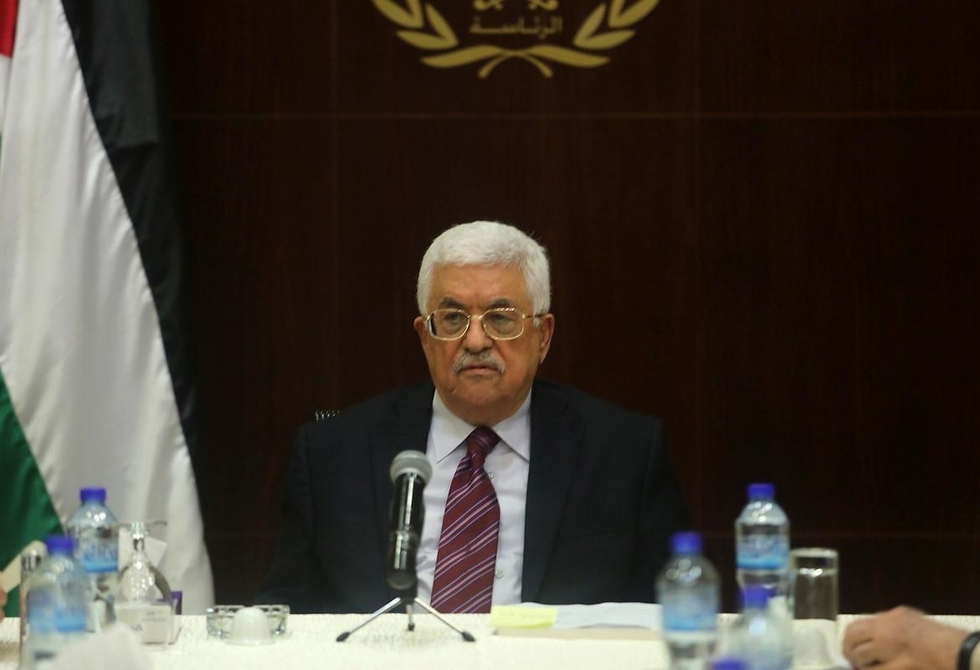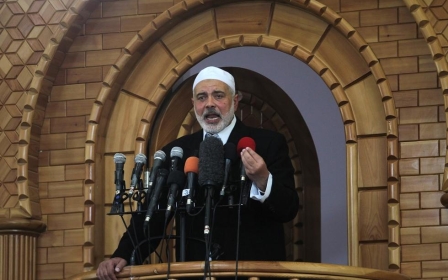Doubts over Abbas’ future highlight wider malaise

Mahmoud Abbas last received the approval of Palestinian voters in the Occupied West Bank and Gaza Strip more than a decade ago. He is now 80 years old, with no vice president, no publicly anointed successor, and no prospect of new elections any time soon.
Last summer was all about Gaza, as Israel unleashed unprecedented violence on the fenced-in enclave. In the West Bank, meanwhile, Israeli forces conducted a clampdown the likes of which had not been seen since the Second Intifada.
This summer, however, with the peace process showing no signs of emerging from its coma, and the occupation’s violence at a relatively low ebb, the focus has been on the intensifying internal political machinations in Ramallah, and in particular, the question mark over Abu Mazen’s presidency.
In June, Yasser Abed Rabbo was dismissed from his role as Palestine Liberation Organisation (PLO) secretary-general by Abbas, and replaced by Saeb Erekat. The move was seen as motivated by Rabbo’s perceived closeness to Mohammad Dahlan and Salam Fayyad, both rivals to Abbas.
Then, earlier this month, Abbas resigned as head of the PLO’s executive committee, along with more than half of the 18-member body, forcing an emergency meeting of the Palestinian National Council (PNC) to elect the committee’s new members. Those who resigned can return through election.
The PNC last met in 2009, also in an emergency capacity, to fill six vacant positions. The last executive committee elections were held in 1996 during a PNC session in the Gaza Strip. The forthcoming PNC meeting is expected to take place in Ramallah within a month.
Surreally, however, there is uncertainty about whether or not these resignations were actually effected. As respected analyst Hani al-Masri wrote today in al-Ayyam:
[Erekat] has denied the resignation - apparently to justify his election as executive committee secretary at the same session in which the resignations were supposedly tendered; but if they have resigned, how was he chosen to a post that he had been already occupying even before the meeting? And if they have not resigned, why was the executive committee invited to an extraordinary session?
These questions are indicative of internal power-plays that for Palestinians are no less dismal for being unsurprising. Moreover, these latest developments are, if not the beginning, certainly not the end of manoeuvrings inside Fatah for the day after Mahmoud Abbas.
The talk in Ramallah is of the different camps preparing for a power struggle, shoring up their support - even collecting guns. Whoever eventually follows Abu Mazen is unlikely to do so through the ballot box.
But is Abbas’ departure even imminent? Some commentators believe so: writing earlier this month, Daoud Kuttab pointed to “his age and his repeated insistence that he does not plan to run in new elections, as well as his most recent comments about his willingness to resign”.
While “some of [Abbas’] actions in the spring and summer of 2015 reflect a leader holding on to power rather than one seeking to give it up,” Kuttab stated that it is “inevitable that Abbas will step down due to his age and the public’s unhappiness with his policies”.
Citing, “informed Palestinian sources,” al-Masri recently reached a similar conclusion - that Abbas is “thinking of resigning in the next few months,” and will probably do so sometime between the PNC meeting set for September and Fatah’s gathering “scheduled for the end of November”.
In public, it is a different story. On 11 August, Fatah central committee member Mahmoud al-Aloul claimed that Abbas would in fact continue to lead the movement, and that the prospective seventh Fatah conference would adopt a programme largely similar to the one affirmed in 2009.
Others have suggested that Abbas’ moves, “far from being a withdrawal from power,” are intended to “reassert” his authority through “snap elections”. Even if he does resign, Abbas may be seeking “to retire with a show of renewed legitimacy, leaving his political allies in power behind him”.
Whether or not Abbas stays or goes, there are bigger questions at stake: the PA can indeed ill “afford a leadership crisis”. As Alaa Tartir, programme director of Al-Shabaka: The Palestinian Policy Network, has argued recently, the current crisis represents a manifestation of the authoritarian trends that have been part and parcel of the so-called state-building project, particularly since 2007.
“The core question that needs to be addressed at this juncture,” Tartir told me, “is ‘where are the Palestinian people in their political system?’” Without “a people-centric political framework,” he continued, “the legitimacy gap will continue to widen, and the PLO institutions will remain in their clinical death status”.
National unity, after a July cabinet reshuffle slammed by Hamas, remains as chimerical a prospect as ever. Hastily convening the PNC, meanwhile, “without ensuring the participation of all shades of the political spectrum and the signatories to the [2011] Cairo Agreement” will ensure that the new institutions “only exacerbate, fragment and aggravate the divisions in the Palestinian situation”.
Despite Netanyahu’s rhetoric, a post-Abbas reality may not be to Israel’s liking. Given that a key reason for Abbas’ desire to leave the scene is disillusionment and frustration with the US and Israel - an implicit acknowledgment he has little to show for a decade-long “negotiations-only strategy” - what will his successor conclude about the best strategies going forward?
Yet any question of confronting Israel is hard to address separate from the widespread malaise affecting the Palestinian political scene, whether it is long-standing, “structural” corruption, or an approach to dissent that includes the detention and assault of student activists.
For some, this looks like a “police state,” but it is more like a police state-in-waiting, a kingdom of petty authorities shaped by the fragmentary and demobilising forces of neoliberal “reform” and “security cooperation”. A banner hung in Ramallah recently urged support for Abbas against “internal and external conspiracies”. This is not a regime brimming with the self-confidence of public validation.
Mouin Rabbani, writing earlier this month on why a new Intifada is unlikely to take place any time soon, described the Ramallah-based leadership as “averse to popular mobilisation”. This may, however, be ultimately the only solution to the crises afflicting the political institutions.
- Ben White is the author of ‘Israeli Apartheid: A Beginner’s Guide’ and ‘Palestinians in Israel: Segregation, Discrimination and Democracy’. He is a writer for Middle East Monitor, and his articles have been published by Al Jazeera, al-Araby, Huffington Post, The Electronic Intifada, The Guardian’s Comment is free, and more.
The views expressed in this article belong to the author and do not necessarily reflect the editorial policy of Middle East Eye.
Photo: Palestinian President Mahmoud Abbas meets with the executive board members of Palestine Liberation Organization (PLO) in Ramallah, West Bank on June 22, 2015. (AA)
Stay informed with MEE's newsletters
Sign up to get the latest alerts, insights and analysis, starting with Turkey Unpacked
Middle East Eye delivers independent and unrivalled coverage and analysis of the Middle East, North Africa and beyond. To learn more about republishing this content and the associated fees, please fill out this form. More about MEE can be found here.





